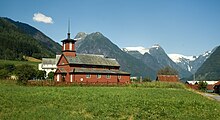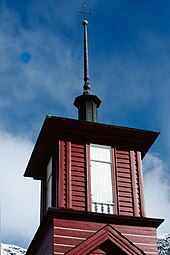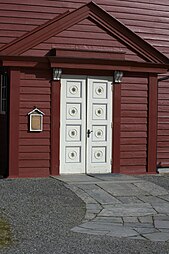Fjærland Church
| Fjærland Church | |
|---|---|
| Fjærland kyrkje | |
 View of the church | |
 | |
| 61°24′13″N 6°44′23″E / 61.4036239269°N 6.73962816596°E | |
| Location | Sogndal Municipality, Vestland |
| Country | Norway |
| Denomination | Church of Norway |
| Previous denomination | Catholic Church |
| Churchmanship | Evangelical Lutheran |
| History | |
| Former name(s) | Mundal kyrkje |
| Status | Parish church |
| Founded | 13th century |
| Consecrated | 13 Aug 1931 |
| Architecture | |
| Functional status | Active |
| Architect(s) | Christian Heinrich Grosch |
| Architectural type | Long church |
| Completed | 1861 |
| Specifications | |
| Capacity | 300 |
| Materials | Wood |
| Administration | |
| Diocese | Bjørgvin bispedømme |
| Deanery | Sogn prosti |
| Parish | Fjærland |
| Type | Church |
| Status | Listed |
| ID | 84153 |
Fjærland Church (Norwegian: Fjærland kyrkje) is a parish church of the Church of Norway in Sogndal Municipality in Vestland county, Norway. It is located in the village of Fjærland, near the northern end of the Fjærlandsfjorden. It is the church for the Fjærland parish which is part of the Sogn prosti (deanery) in the Diocese of Bjørgvin. The white, wooden church was built in a long church design in 1861 using plans drawn up by the architect Christian Henrik Grosch. The church seats about 300 people.[1][2]
History
[edit]The earliest existing historical records of the church date back to the year 1306, but the church was not new that year. The first church at Fjærland was likely built in the 12th century and it was a wooden stave church. Historically, the church was also known as the Mundal Church. In 1610, the church was destroyed in a storm. A new timber-framed long church was built at Mundal to replace the old church. The building was described as a small church with a nave that measured about 10 by 7.5 metres (33 ft × 25 ft) and a choir that measured about 5 by 5 metres (16 ft × 16 ft). Inside, the church had twisted black and brown colored branches painted on the walls and the ceiling had a large painting of the sun, moon, and stars. Around 1680, a new church porch and tower were built on the west end. In 1861, the church was torn down to make room for the present church.[3][4]
In 1931, the church was expanded and remodeled. The architect Johan Lindstrom was responsible for the major expansion of the church that year.[3] During the renovation, the old steeple was removed and a spire with a cross on top was put in its place, giving the church a unique look. The church was consecrated again on 13 August 1931 by Bishop Andreas Fleischer after the renovations.[5][4]
From ancient times the village had no road connections to the outside world. All transportation to and from the outside world took place via the Fjærlandsfjord. The first road into Fjærland to Skei in Jølster to the north was in 1986 and then a road and tunnel to Sogndalsfjøra to the south was completed in 1994. After a referendum in 2000, the village was transferred from Balestrand to Sogndal municipality. This also meant that the church switched from the Balestrand parish to the Sogndal parish.[6][5][4]
Media gallery
[edit]-
Exterior front
-
Exterior back
-
View of the spire
-
View of the main doors
-
View of the church before the 1931 reconstruction
See also
[edit]References
[edit]- ^ "Fjærland kyrkje". Kirkesøk: Kirkebyggdatabasen. Retrieved 11 December 2019.
- ^ "Oversikt over Nåværende Kirker" (in Norwegian). KirkeKonsulenten.no. Retrieved 12 December 2019.
- ^ a b "Fjærland kyrkjestad" (in Norwegian). Norwegian Directorate for Cultural Heritage. Retrieved 12 December 2019.
- ^ a b c "Fjærland kirke". Norges-Kirker.no (in Norwegian). Retrieved 2 October 2021.
- ^ a b Henden Aaraas, Margrethe; Vengen, Sigurd; Gjerde, Anders. "Fjærland kyrkje" (in Norwegian). Fylkesarkivet. Retrieved 12 December 2019.
- ^ "Fjærland kyrkje" (in Norwegian). Sogndal kyrkjelege fellesråd. Retrieved 12 February 2014.







